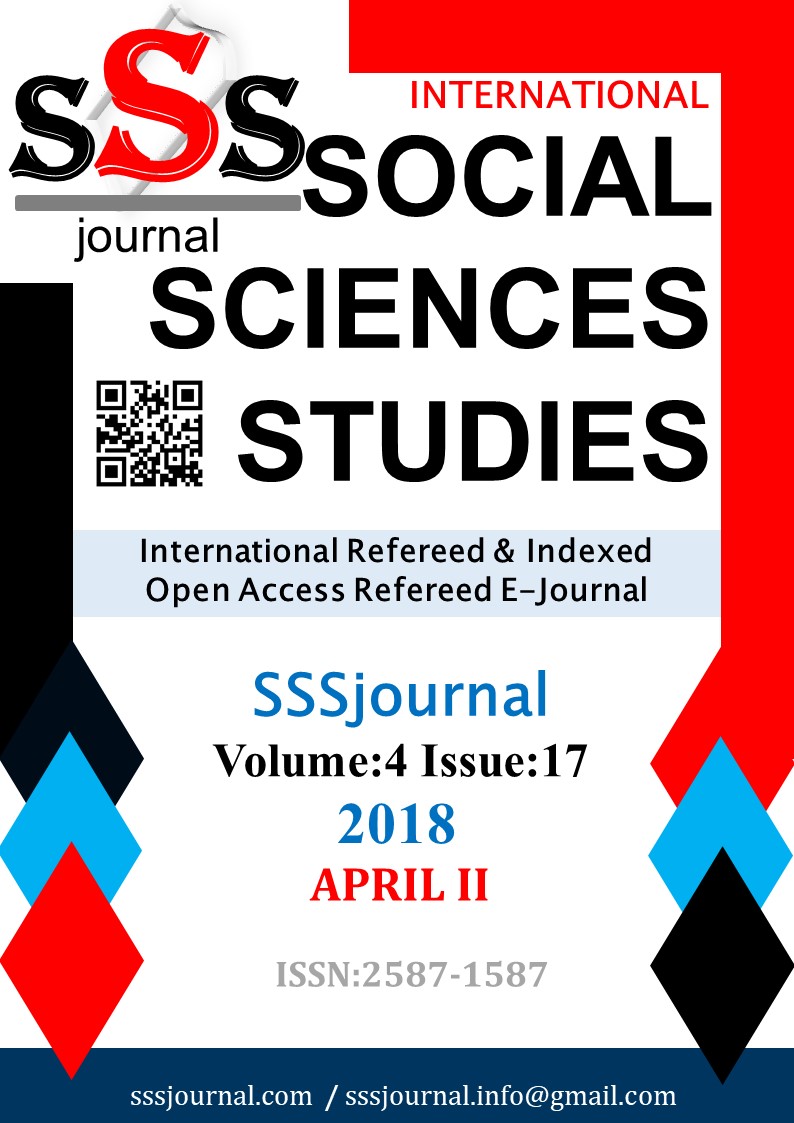THE REPRESENTATION OF THE POST-INDUSTRIAL AND LATE CAPITALIST SOCIETY IN MURIEL SPARK’S NOT TO DISTURB
Author :
Abstract
Muriel Spark’s novel Not to Disturb (1971) is a postmodern novel which can be characterized by Spark’s use of pastiche, intertextuality, and temporal distortion. Spark’s metafictional novel also offers a portrayal of a depthless society with a critique of postmodern culture and late capitalism in which the commodification, aestheticization and the screenification of everyday life which has been transformed into a capitalist commodity and consumer goods can be clearly observed. The society in the postmodern age is described as a “service society”, or “information society” or “knowledge society”. Daniel Bell prefers to define this society as the “postindustrial society” (1996: 424) in which “telecommunications and computers are strategic for the exchange of information and knowledge” (1996: 427).This paper sets out to discuss how Muriel Spark reflects the contemporary media landscape with the media and communicative technologies in a post-industrial society with great emphasis on the commercialization and commodification of knowledge and information, which play a crucial role not only in creating and maintaining the hyperreal but also in re/shaping social relations and processes, as discussed by the critics including Jean Baudrillard and Daniel Bell in his work The Coming of Post-Industrial Society.
Keywords
Abstract
Muriel Spark’s novel Not to Disturb (1971) is a postmodern novel which can be characterized by Spark’s use of pastiche, intertextuality, and temporal distortion. Spark’s metafictional novel also offers a portrayal of a depthless society with a critique of postmodern culture and late capitalism in which the commodification, aestheticization and the screenification of everyday life which has been transformed into a capitalist commodity and consumer goods can be clearly observed. The society in the postmodern age is described as a “service society”, or “information society” or “knowledge society”. Daniel Bell prefers to define this society as the “postindustrial society” (1996: 424) in which “telecommunications and computers are strategic for the exchange of information and knowledge” (1996: 427).This paper sets out to discuss how Muriel Spark reflects the contemporary media landscape with the media and communicative technologies in a post-industrial society with great emphasis on the commercialization and commodification of knowledge and information, which play a crucial role not only in creating and maintaining the hyperreal but also in re/shaping social relations and processes, as discussed by the critics including Jean Baudrillard and Daniel Bell in his work The Coming of Post-Industrial Society.
Keywords
- Arnould, Eric J. and Thompson, Craig J. “Consumer Culture Theory (CCT): Twenty Years of Research.” Journal of Consumer Research, Vol. 31, No. 4, 2005, pp. 868-882.
- Baudrillard, Jean. Telemorphosis: Preceded by Dust Breeding, trans. Drew S. Burk, Minneapolis, MN: Univocal, 2011.
- Baudrillard, Jean. Baudrillard Live: Selected Interviews, edited by Mike Gane. New Routledge, Chapman & Hall, 2002.
- Baudrillard, Jean. “From Symbolic Exchange and Death.” From Modernism to Postmodernism: An Anthology, edited by Lawrence Cahoone, Blackwell Publishing, 1996, pp. 437-461.
- Baudrillard, Jean. “The End of the Panoptican.” Simulations. Semiotext(e), 1995.
- Baudrillard, Jean. “The Precession of Simulacra.” Simulacra and Simulation. The University of Michigan, 1994, pp. 1-42.
- Baudrillard, Jean. Simulacra and Simulation. The University of Michigan, 1994.
- Baudrillard, Jean and Evans, Arthur B. “Simulacra and Science Fiction.” Science Fiction Studies, Vol. 18, No. 3, 1991, pp. 309-313.
- Baudrillard, Jean and Maclean, Marie. “The Masses: The Implosion of the Social in the Media.” New Literary History, Vol. 16, No. 3, 1985, pp. 577-589.
- Bell, Daniel. “From The Coming of Post-Industrial Society.” From Modernism to Postmodernism: An Anthology, edited by Lawrence Cahoone, Blackwell Publishing, 1996, pp. 423-436.
- Clarke, David B. et al., Eds. Jean Baudrillard: Fatal Theories. New York: Routledge, 2008.Deleuze, Gilles and Guattari, Felix. “From Anti-Oedipus: Capitalism and Schizophrenia.” From Modernismto Postmodernism: An Anthology, edited by Lawrence Cahoone, Blackwell Publishing, 1996, pp. 401-422.
- Dholakia, Nikhilesh & Reyes, Ian. “Virtuality as place and process.” Journal of Marketing Management, Vol. 29, No. 13-14, 2013, pp. 1580–1591.
- Drucker, Peter F. The Practice of Management. London: Heinemann, 1954.Drucker, Peter F. Post-Capitalist Society. New York: HarperCollins, 1993.
- Foucault, Michel. “From Truth and Power”. From Modernism to Postmodernism: An Anthology, edited by Lawrence Cahoone, Blackwell Publishing, 1996, pp. 379-381.
- Heim, Michael. The Metaphysics of Virtual Reality. Oxford: Oxford University Press, 1993.
- Jameson, Fredric. “From The Cultural Logic of Late Capitalism.” From Modernism to Postmodernism: An Jameson, Fredric. “Globalization and Political Strategy.” New Left Review, Vol. 4, 2000, pp. 49-68.
- Kellner, Douglas and Share, Jeff. “Critical Media Literacy, Democracy and the Reconstruction ofEducation.” Media Literacy: A Reader, edited by Donaldo Pereira Macedo, Shirley R. Steinberg, Peter Lang, 2007.
- Kellner, Douglas, Ed. Baudrillard: A Critical Reader, Cambridge, MA.: Blackwell, 1994.
- Kline, Kip. “Jean Baudrillard and the Limits of Critical Media Literacy.” Educational Theory, Vol. 66, No. 5, 2016, pp.641-656.
- McQuail, Denis. McQuail’s Mass Communication Theory. Sage, 2010. Pawlett W. Jean Baudrillard. Routledge: London, 2007.
- Pettmann, Fredrick. “Introduction.” Fatal Strategies by Jean Baudrillard. Los Angeles: Semiotext(e), 2008.
- Robbins, K. “Cyberspace and the world we live in”. The Cybercultures Reader, edited by D. Bell, and B. M. Kennedy, New York, NY: Routledge, 1996, pp. 77-95.
- Rørvik, Emil André and Brodersen, Marianne B. “Real Virtuality.” Culture Unbound, Volume 4, 2012: pp. 637-659.
- Sontag, Susan. Styles of Radical Will. London, Penguin Books, 2009. Spark, Muriel. Not To Disturb. Penguin Books, 1977.





